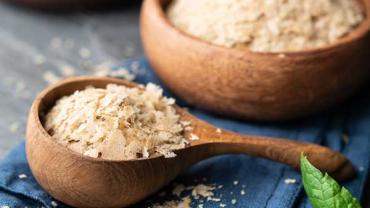
Beta-glucans have been gaining much attention over the last several years due to the emergence of medicinal mushrooms in Western culture. They are now ubiquitous in health food stores across the country, mainly for their immunomodulatory properties and cancer-protective effects. While edible fungi (e.g., reishi, maitake, lion’s mane, chaga) may be the most well-known source of beta-glucans, they are present in a variety of other food products, such as oats, barley, seaweeds, and yeast, as well as in dietary supplements.
Beta-Glucans: What are they?
Beta-glucan is a non-starch polysaccharide, prebiotic fiber formed primarily by ?-1,3 and 1,6 glycosidic bonds that are known to possess numerous health benefits depending on the molecular structure of each type. Beta-glucans, particularly those found in cereal grains, have been shown in research to help lower cholesterol levels (via effectively binding serum cholesterol), as well as play a beneficial role in obesity, metabolic disorders, and other chronic non-communicable diseases. As a prebiotic fiber, they also play a significant role in promoting a healthy microbiome via stimulating growth of beneficial bacteria species, mitigating pathogenic ones, and modulating inflammation to optimize the gut environment.
The Case for ?-Glucans as a Dietary Supplement for Immune System Support
According to a study published in 2019 in the journal Molecules, “the relationship between immunity and nutrition is considered completely interconnected.” Beta-glucans act on several immune receptors that stimulate immune cell activity, including T-cells, macrophages, neutrophils, monocytes, natural killer (NK) cells, and dendritic cells, and as a result, pose modulatory effects on both the innate and adaptive branches of the immune system. Dectin-I, a protein receptor on the surface of macrophages and dendritic cells, can initiate and regulate the innate immune response by binding insoluble ?-1,3 and 1,6 glucans, essential for controlling infection, while water-soluble ?-glucans bind to CR3 receptors, triggering adaptive immune response. ?-glucans enhance phagocytosis and trigger release of various interleukins and cytokines (that also possess cytotoxic anti-cancer properties) such as TNF-?, IFN-? and NF-??, while also helping support regulation of the T-helper cell 1 and Th-2 balance for immunological homeostasis.
In a previous article, we discussed how yeast-derived ?-1,3/1,6 glucan, delivered as an oral supplement daily for 90 days during the winter months, demonstrated protective effects against upper respiratory tract infections and reduced symptom duration in already infected older adults between 50 and 70 years old. Furthermore, interferon concentrations in serum were elevated in the ?-glucan group at day 45, which have cytoprotective abilities from viral infections and immunomodulatory properties. It is important to mention that all populations, especially children, athletes (from exercise-induced immune suppression), and the elderly may benefit from this compound to support a healthy immune system, especially during vulnerable periods such as cold and flu season.
Vaccine research shows that ?-1,3 glucan from fungal cell walls produces robust humoral and cellular immune responses when exposed to antigens. Moreover, ?-glucans are known to exert antioxidant activities via their reactive oxygen species (ROS)-scavenging abilities by way of the circulatory system and the mucosal immune system. In particular, beta-glucan from barley was shown to possess significantly higher total antioxidant capacity compared to oats and yeast.
Fortunately, during these somewhat uncertain times, cereal grains like oats and barley are inexpensive and available for purchase in most grocery stores and online. In addition to managing stress and maintaining adequate sleep and a whole-food diet, encouraging patients to incorporate mushroom and/or yeast-derived ?-glucan supplementation into their daily supplement regimen may be a wise choice to further support both a robust innate and adaptive immune system.